This Memorial Day weekend, radios are blaring but not from the usual sources
 It's Memorial Day long weekend...the traditional informal start to summer. When beaches open, shorts and bikinis get worn for the first time of the year, and BBQ grills are ready for use. It used to be this was the weekend you'd really start hearing what total strangers where listening to. Not too long ago, when you weren't cranking out your favorite radio station's tunes while cruising with the windows down, you'd see people with their boom boxes blaring in parks, walking down the sidewalk, in the neighbor's backyard or at the beach.
It's Memorial Day long weekend...the traditional informal start to summer. When beaches open, shorts and bikinis get worn for the first time of the year, and BBQ grills are ready for use. It used to be this was the weekend you'd really start hearing what total strangers where listening to. Not too long ago, when you weren't cranking out your favorite radio station's tunes while cruising with the windows down, you'd see people with their boom boxes blaring in parks, walking down the sidewalk, in the neighbor's backyard or at the beach. It guess we are more polite now...everyone's got their iPod earbuds instead.
It guess we are more polite now...everyone's got their iPod earbuds instead.
Despite what you most often read about radio lately (you know, commercial radio sucks, too corporate, too stale, run by suits instead of creative people, lower amounts people spent listening to commercial year after year, yadda yadda), "radio" usage is actually hotter than ever...if you expand the definition of radio beyond the traditional local commercial radio station you listen to getting ready in the morning, driving with you to work and back or even listening to when you're putzing around doing house chores. "Radio" is everywhere now -- satellites, online (thousands of online stations, RealAudio, AOL, Yahoo Launch, MSN, etc.), on your cellphones, on iPods, music libraries on your computer so you can hear the playlists you want to hear whenever you want...without the commercials. Albeit slowly, even traditional commercial radio is trying to catch up by streaming their broadcasts online and -- after more than 10 years of reluctance to enter the digital broadcast age -- by getting behind HD Radio. By the end of the year, more than 1000 "secret" sister channels will be broadcasting in "high def digital" adjacent to their big brother regular radio stations. All you need is a special radio receiver that can pick up the stations. At a cost of $300 to $500, mind you.
"Radio" is everywhere now -- satellites, online (thousands of online stations, RealAudio, AOL, Yahoo Launch, MSN, etc.), on your cellphones, on iPods, music libraries on your computer so you can hear the playlists you want to hear whenever you want...without the commercials. Albeit slowly, even traditional commercial radio is trying to catch up by streaming their broadcasts online and -- after more than 10 years of reluctance to enter the digital broadcast age -- by getting behind HD Radio. By the end of the year, more than 1000 "secret" sister channels will be broadcasting in "high def digital" adjacent to their big brother regular radio stations. All you need is a special radio receiver that can pick up the stations. At a cost of $300 to $500, mind you.
Really, there are two camps watching the trend of radio usage and viability. Either radio is dying an ever quickening death...or radio is at its most exciting time ever.  I'm actually in the second camp, being a radio fan. That's for radio as a whole concept. Things like satellite radio, Motorola's iRadio unit, the free streaming of internet radio stations, the iPod...all this new media updating of radio.
I'm actually in the second camp, being a radio fan. That's for radio as a whole concept. Things like satellite radio, Motorola's iRadio unit, the free streaming of internet radio stations, the iPod...all this new media updating of radio.
There is a tremendous amount of energy and investment pouring into doing radio in a different way than traditional commercial radio. Any form of radio thinking and doing for the future makes you immediately want to turn it on and turn up.
For most of radio's history, it's power was purely local-based. Government ownership rules prevented any one company from owning too many stations. This limited its influence as well as its power, helping reduce the potential of corruption.  As the famous Lord Acton quote goes, "Power corrupts, and absolute power corrupts absolutely." Well, radio felt it needed more power in order to better compete against larger media revenue threats; that the rules keeping their companies and its industry "smaller" were unfair. So it got what it wanted. Regulations were dropped, radio rapidly "grew" through massive consolidation, and radio station owners got the power they wanted. But, instead of using that new power to truly invest in real growth and to make the transformation required to thrive in the digital age, it wrongly focused on being a better "sell" against other old medias like newspapers and TV.
As the famous Lord Acton quote goes, "Power corrupts, and absolute power corrupts absolutely." Well, radio felt it needed more power in order to better compete against larger media revenue threats; that the rules keeping their companies and its industry "smaller" were unfair. So it got what it wanted. Regulations were dropped, radio rapidly "grew" through massive consolidation, and radio station owners got the power they wanted. But, instead of using that new power to truly invest in real growth and to make the transformation required to thrive in the digital age, it wrongly focused on being a better "sell" against other old medias like newspapers and TV.
The consolidation of commercial radio created this massive new bureaucratic mess radio (and any industry) had ever managed before. There was no model. There was no example. There were no clearcut controls. Only the rules of whom actually possessed the power and however they decided to use that power. At best, the results are mixed, if I were to remain polite as an observer. If I were being honest and real, this new consolidation power did indeed corrupt...and the huge sucking sound heard across America was coming out from everyone's radio speakers. A quality vacuum had been created. Fortunately, the passion of people that still loved creating great radio continued...and moved on to loads of new digital tools transmitting to the micro masses. In total (combining all versions of traditional commercial radio with new digital versions), Americans are listening to more "radio" than ever before. 94% of Americans still listen to commercial radio at least once a week. More than 50 million iPods have been sold. XM and Sirius satellite radio have more than 11 million subscribers. There are more than 1 BILLION that have internet access around the world now and it is estimated that 16% listen to some version of radio streamed on the Net at least once a week...that's another 160 million times "radio" has been listened to.
In total (combining all versions of traditional commercial radio with new digital versions), Americans are listening to more "radio" than ever before. 94% of Americans still listen to commercial radio at least once a week. More than 50 million iPods have been sold. XM and Sirius satellite radio have more than 11 million subscribers. There are more than 1 BILLION that have internet access around the world now and it is estimated that 16% listen to some version of radio streamed on the Net at least once a week...that's another 160 million times "radio" has been listened to.
All the excitement in radio comes from innovative visionaries whom embraced the digital age and how to make radio better. Too bad the newly-acquired "power" commercial radio obtained (re: bought) just 10 years ago corrupted too many of them to truly see the need for innovation. Is commercial radio too late to the party to survive this evolutionary change? As a media trend watcher, the radio industry is sure late in the game and are doing much too little. Some "second tier" companies are thinking big where innovation is more important than company size. Maybe they can be a guiding light.
The end result of power corrupting always end poorly when the corruption isn't fixed from within. That's the beauty of the capitalistic system. The fittest survive. The obsolete get tossed aside and forgotten. Radio listeners are already making their decisions. I wonder what their choice will be in a few years from now?
Radio listeners are already making their decisions. I wonder what their choice will be in a few years from now?
Meanwhile, whether you are turning burgers on the BBQ, driving with the top down, jogging alongside the beach or through the park, turn up those radios this Memorial Day...on whatever device you're listening to it on.
Last month, Red Herring published an excellent article on how radio's late efforts entering the competitive digital media world are not grabbing listeners yet. Among the quotes:"The industry has begun testing new electronic ratings technologies, but the four-decade-old diary ratings system is keeping the industry, which depends almost entirely on advertising, at a significant disadvantage in competing with instant-feedback media such as the Internet. The industry, which initially steered clear of the Internet and viewed it as a dangerous competitor, has embraced digital technologies such as podcasting, High Definition Radio, the Internet, and improved listener-counting methods—significant steps for the conservative industry. But the new technologies have failed to arrest the exodus of younger listeners who choose MP3 downloads, satellite radio, Internet radio, and other alternative entertainment options over terrestrial radio...
Read the entire article here at Red Herring.
posted by Unknown @ Saturday, May 27, 2006,
,
![]()
![]()
CBS Radio Schizophrenia in New York City: Now Breaking Free FM with Danny Bonaduce??
 The latest trend ratings for the first month of the Spring season came out today and CBS Radio is still suffering on the FM dial in the #1 market, New York City. According to Arbitron, Mix (WNEW) and Jack (WCBS) are tied for 20th with a 1.7 market share while Free FM is still dragged down to a dismal 1.1 share despite bringing on Opie and Anthony for the last month to replace the awful David Lee Roth Radio show (note: ratings won't begin to include O&A until next month).
The latest trend ratings for the first month of the Spring season came out today and CBS Radio is still suffering on the FM dial in the #1 market, New York City. According to Arbitron, Mix (WNEW) and Jack (WCBS) are tied for 20th with a 1.7 market share while Free FM is still dragged down to a dismal 1.1 share despite bringing on Opie and Anthony for the last month to replace the awful David Lee Roth Radio show (note: ratings won't begin to include O&A until next month).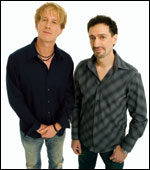 So far, Opie and Anthony have been good, steady and controlled. They are slowly bringing in their established characters from when they were doing afternoons on Hot Talk WNEW prior to their scandalous exile and later brought over to their Sirius Satellite radio show. It's "comforting" to hear their familiar voices on the radio...but not yet compelling.
So far, Opie and Anthony have been good, steady and controlled. They are slowly bringing in their established characters from when they were doing afternoons on Hot Talk WNEW prior to their scandalous exile and later brought over to their Sirius Satellite radio show. It's "comforting" to hear their familiar voices on the radio...but not yet compelling.
Over at sister FM stations Mix and Jack, they're both mired with major audience disconnects with the format radio listeners expect to hear. WNEW's 102.7FM was a legendary Rock station address in New York for 30 years. Then it dropped Rock and changed to an ultra-male (not very female friendly) Hot Talk format experiment. They've now been targeting women for the past 3+ years, hoping that the radio listeners they pissed off and/or offended before (with notorious shows like Opie and Anthony) would forgive or forget. They haven't.
WCBS's 101.1FM was THE place to turn on the radio dial for the major Oldies hits of all time combined with some of the biggest radio personalities ever. Because their audience was getting "too old" (older than 50) to attract the premium listener demos (25-54), they junked a still-successful format in terms of audience size and ratings rank against the competition, replacing it with an canned "anti-personality" Jack character and a bunch of train-wreck songs New Yorkers really don't want to hear. At least not on that frequency.
Now, back over to Free FM, its 1st five months might be described as schizophrenic. The failure of Roth Radio blew any post-Howard Stern carryover; it simply was too painful to listen to, even for Stern fans who like things that cross the boundaries. That goodwill was killed within days.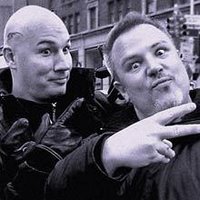 Elvis and JV in middays -- formerly morning stars in San Francisco for a decade -- have been great in middays, even though it seems like they get a bit stifled doing middays radio instead of having the spotlight of mornings they crave. They also get miffed frequently that they've received very little marketing support.
Elvis and JV in middays -- formerly morning stars in San Francisco for a decade -- have been great in middays, even though it seems like they get a bit stifled doing middays radio instead of having the spotlight of mornings they crave. They also get miffed frequently that they've received very little marketing support.
Jim Cramer's Mad Money and The Penn Jillette show are one-hour each and are there as decent pace changers. In fact, Penn (of the Vegas duo Penn & Teller) is regularly among the top 10 podcast downloads on iTunes. One of the constant bright spots on Free FM has been The Radio Chick show in afternoon. As a team, they've got a well-lubricated, highly-entertaining, smart talk show "classically" formatted as a professional talk show normally heard on AM radio. Big fan of them.
One of the constant bright spots on Free FM has been The Radio Chick show in afternoon. As a team, they've got a well-lubricated, highly-entertaining, smart talk show "classically" formatted as a professional talk show normally heard on AM radio. Big fan of them.
After they are done, Free FM had something building with The Booker Show; Chris Booker had a 10-year run in New York, mostly at Free FM's predecessor alternative K-Rock. So he already had a built in audience. But he left at the same time Roth left taking a better gig doing mornings in Phily on hit station Q102. With Booker and Roth both leaving, they also decided to get rid of the Jake and Jackie show, deciding to do Free Rock music programming instead and occasionally experimenting with new partners for Jackie (they decided to completely toss Jake, no doubt for constantly ranting negatively at station management and ownership). The latest experiment may be their most wild one: bringing famous walking implosion/attention whore Danny Bonaduce. His most notable recent story was last year's Breaking Bonaduce reality TV saga which weekly showed the downward spiral of a former TV star as he repeatedly made damaging decisions against himself and his family. The show -- and the destruction it caused -- ultimately cost him his LA morning gig on KYSR, even though he went and completed rehab.
The latest experiment may be their most wild one: bringing famous walking implosion/attention whore Danny Bonaduce. His most notable recent story was last year's Breaking Bonaduce reality TV saga which weekly showed the downward spiral of a former TV star as he repeatedly made damaging decisions against himself and his family. The show -- and the destruction it caused -- ultimately cost him his LA morning gig on KYSR, even though he went and completed rehab.
I have to admit it was compelling TV in a circus freak show sort of way, even offering good advice and perspective for your own life. Danny's meltdowns, jealousy, lack of anger management control issues and alcoholic spirals basically showed the viewer how such selfish behavior impacts the family. Due to its ratings success and overall buzz, season two comes up later this year.
So now, Free FM is trying out Danny Bonaduce this evening (with Jackie), will get paired during middays with JV tomorrow (as Elvis goes home to be with his dying mom), and then do another evening shift on Wednesday. Will this be a permanent move for evenings or later? Or will it be another example of Free FM breaking down? I bet it will be at least a long-term let's-see-what-happens test, since Free FM still seems to be in test mode trying to find any traction.
Will this be a permanent move for evenings or later? Or will it be another example of Free FM breaking down? I bet it will be at least a long-term let's-see-what-happens test, since Free FM still seems to be in test mode trying to find any traction.
Bonaduce's history is filled with radio show destructions, including when he was on the air in New York in the late '90s. Most New Yorkers probably won't remember that short-stint; let's see how long Bonaduce can ride the rails in NYC this time. Personally, I think he's very talented when he's on his game; it's those demon days that keep tripping him up. Maybe he can get back on top. Everyone loves a comeback story...Free FM is still looking for one...
posted by Unknown @ Monday, May 22, 2006,
,
![]()
![]()
Howard Stern and "New" Radio: More Up Close with John Parikhal
 Last Friday, we posted an upcoming interview from fmqb.com which got Up Close with Joint Communications CEO John Parikhal. As usual, John pulls no punches serving as one of the radio industry's trusted sages for views on the future.
Last Friday, we posted an upcoming interview from fmqb.com which got Up Close with Joint Communications CEO John Parikhal. As usual, John pulls no punches serving as one of the radio industry's trusted sages for views on the future.
In the post, John talked about the listener disconnect for both the music and radio industries; how the younger generations view radio; the prospects of HD Radio and more.
In today's continuation of the lengthy interview, John talks about Howard Stern, including why he left and how it impacts terrestrial radio now that he's gone as well as his prospects on satellite radio. Plus, The FCC, Oprah Winfrey on XM, some insight on Opie and Anthony and how the new forms of radio are continuing to evolve.
Interviewer FMQB CEO Fred Deane digs in and gets even more Up Close:
FMQB: You have always valued air talent as precious gems for radio. Why did terrestrial radio allow marquis talent to shift to satellite? Did the FCC indecency crackdown leverage strategy in this area?
Parikhal: Radio did face the FCC head on, and the FCC was extremely aggressive in attacking the Howard Stern's of the business. With Opie & Anthony, you can make an argument that once people started listening to them it was shocking what they were doing. There was a period (early on) when they were on the radio and were having women put coke bottles in their vaginas, and because they had this small 18-24-year-old audience listening who loved them to death and nobody else was listening, there were no complaints. O&A only got caught when their ego got in the way, and they got on a lot of markets and were heard more, and then they did really stupid things and eventually they got caught with the church incident.
Stern, on the other hand, actually saw his ratings and audience increase after they stopped him from doing all the really rude stuff and let him go to what his really core talent was, but even that wasn't enough. From Stern's standpoint, there was almost nothing that was going to keep the guy. He was gone, "I have to be that careful about stepping over the line, I want to go do something entirely different."
Stern was one of those situations where it was probably a combination of ineffectual management at the top and Stern wanting to try something different. They probably could have kept him, but they were really worried about the FCC.
FMQB: Infinity had battled the FCC in the past regarding Stern fines, did it get too risky for radio to continue to defend some of the more egregious stunts?
Parikhal: With Bubba's killing a pig in a parking lot kind-of-thing, and with the O&A St. Patrick's incident, they just went too far. However, had management worked with them, they could have done the same thing they did with Howard Stern which was still kept him at the edge without going too far. It really was a combination of the FCC and management that didn't have the skill set to deal with extremely edgy/dangerous talent. That's pretty clear right now. We saw it earlier this year with CBS for example. The skill set on managing and developing talent doesn't appear to be there at the senior levels. I've tried to discuss solutions to senior people at radio but they've argued with my logic. It's unbelievable. There are several senior executives who are literally afraid to talk to me because they don't want to hear the fact that there's another way to do it.
FMQB: Satellite radio has become very aggressive in securing brand name talent. Did the market capitalization gained by the sat-casters (at the time) justify the investment made in top talent?
Parikhal: They paid too much money and didn't fully think it through. They probably paid more than they needed on the Stern deal; however, the economics of that business are different. If they pay him a hundred-million-dollars a year plus stock, and they gain a million-and-a-half subscribers they wouldn't have otherwise, and those people stay, then the economics work. In the Stern scenario, that may be the case. The others I'm not so sure. But Stern's the exception that proves the rule. He's an extraordinarily unique talent.
I'm scratching my head over the Oprah Winfrey deal though. I don't get it. There are people smarter than me out there; maybe they know something I don't know.
More with the interview regarding radio's future tomorrow...we welcome your comments to the Jointblog.
(excerpts re-published with permission from fmqb.com)
posted by Unknown @ Tuesday, May 16, 2006,
,
![]()
![]()
MacBoy vs PCdrone: More Great TV Ads of What Makes Apple So Good
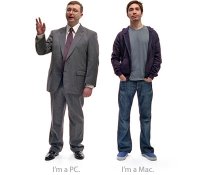 To Apple, you are what you compute with.
To Apple, you are what you compute with.
"I'm a Mac. And I'm a PC".
Brilliant!
I love the TV ad campaigns when Apple Computers takes on Microsoft. Over the years, Apple has a long history for skewering Microsoft specifically and the Windows-dominated PC world in general. Best of all, they are done artfully -- unlike any "negative" ad campaign done by politicians. While the famous "1984" Macintosh ad which aired once during the Super Bowl cinematically sought to destroy the futureworld of office drone lemmings using Windows (hmmm, how prescient were they?), the more recent campaigns have been only cool.
The Switch campaigns from a few years ago, showing how easy it is for a Mac to read PC apps and file, making the file transfer easy.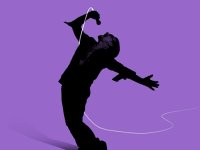 The dancing shadow iPod/iTunes ads show music fans (love the Wolfmother!) exactly "where they want to go today" (Microsoft's tag line from the early nils): to the store to go buy an iPod.
The dancing shadow iPod/iTunes ads show music fans (love the Wolfmother!) exactly "where they want to go today" (Microsoft's tag line from the early nils): to the store to go buy an iPod.
The latest Apple vs Micosoft ads are the best yet. In a charming way, the shortcomings of Windows PCs are just as clearly shown as the much better Apple.
These six new ads are so good -- the dim, trying, greying, overweight PC user is trying to say he's just as good as anything on the Apple. To show how cool he is, he even listens to an iPod, which gets used on PCs, too. The PC user dweeb tries so hard to be cool but, of course, fails miserably.
While the Apple user simply is calm, together, helpful, easy to talk with and completely naturally cool because of the kind of computing he does.
For example, in one spot, the youthful MacBoy (wearing sneakers, of course) talks about all the apps included with every iLife-installed Apple computer. Older, greying PCsuit has bundles, too...like a clock and a calculator. In another, PC-dweeb is sneezing from "viruses", while MacBoy is happily virus-free, because Apple's simply don't get "sick". The others show the easy of networking with other computers and devices, even PCs. Or how the Wall Street Journal's Walt Mossberg praises the new Apple laptop. Or how Apple's simply don't have the freezing and restarting problems of PCs.
Brilliant! Because it is TRUE! Imagine that, advertising that is accurate.
If the ad campaign were reversed, Microsoft would say little by saying too much, going on and on....just like the way they package their products on the retail shelf. In March a popular spoof imaging how Microsoft would package the iPod box brilliantly captures Microsoft lack of design or sophistication.
This new campaign from Apple is fabulous simply because it captures the brand essence of Apple perfectly. Yes, we Apple users love our various Apple products, refusing to ever be the office lemming dweeb. But at least we'll still make nice with you.
To see all the ads, click here.
posted by Unknown @ Monday, May 15, 2006,
,
![]()
![]()
Up Close FMQB Interview With John Parikhal
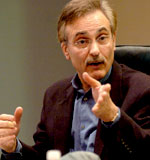 Joint Communications CEO John Parikhal is featured in an upcoming issue this month in FMQB -- a leading source for radio and music industry news.
Joint Communications CEO John Parikhal is featured in an upcoming issue this month in FMQB -- a leading source for radio and music industry news.
Periodically, FMQB likes to check in with John for his point of view on the state of radio and media to give a "look forward" peak at future trends, opportunities and developing problems. The upcoming full interview covers a wide range of issues, including the impact of Howard Stern move to satellite radio, HD Radio, mega-corporate radio, new music for teens, and much more. They've released early excerpts as they go Up Close:
Among the highlights:
FMQB: Both the music and radio industries have been out of alignment with the younger consumer, an increasing trend over the past ten years. What are the inherent problems with the disconnection?
Parikhal: It's the perfect storm syndrome. Had the technology not come along, you would have radio sliding a little bit less and you would have had the old record business still hanging on. Part of the disconnection has always been there...With digitization it suddenly became possible to hear a whole bunch of music...you didn't have to rely on radio.
FMQB: How did radio consolidation influence the music industry model?
Parikhal: The traditional relationship between radio and labels eroded.
FMQB: Has radio leadership given up on targeting the younger demo?
Parikhal: As recently as three or four years ago I was talking to some of the more senior people at radio companies. Literally their words were, "We don't care about teenagers. We can't make enough money from them. We don't care."...radio became basically like the slaughterhouse, a pork belly or commodities business, where it was all about moving numbers. They didn't care about planting new ground. I kept asking people, 'If you have five stations in a cluster, why don't you program one just for teens?' None of them wanted to do it...Now of course the consequences are being felt.
FMQB: Where is the next generation of radio consumers going to come from? What does this do to radio's intermediate to long-term future?
Parikhal: They are there, but they don't care about the medium other than as a utility. As my 14-year-old daughter and all of her friends said when I did a little focus group with them: "Radio just sucks." I said, "Well, I see you listening to it from time to time." They responded, "Yeah, when there's nothing I want to hear on the iPod. I'll hit the buttons on the stations, but usually there's nothing there, and then we just turn it off and go to the computer." That's what we're seeing with a lot of younger teens. Radio has a real perceptual problem with today's youth and it will present a problem down the road if it is not aggressively attacked today...Fact is, though, radio's not going to die overnight. There are hundreds of millions of radios in cars, homes and work places, and people are still going to listen to them.
FMQB: What is your take on HD radio?
Parikhal: HD is a technology for which there is no real clear demand...What they really want is fewer commercials, fewer interruptions, and more music, or more Talk on the Talk side.
FMQB: Is HD indeed a credible replacement technology for the traditional product?
Parikhal: If you look at what I call the technology adoption curve, replacement technologies generally take somewhere between ten and fifteen years to fully work their way through the system. What I call add-on technologies, something I can plug into an exiting product, generally take seven to ten. For example, VCR and DVD players are add-on technologies. You simply plug them into your TV and they work; you don't have to do anything else. So, the adoption of the DVD player (we're into the seventh year) is pretty well finished because it was just a plug-in. On the other hand, HD television, a replacement technology, has taken a heck of a lot longer to find its way through the system, and still isn't fully through the system. HD radio is really a replacement technology.
FMQB: You sound like you have major issues with the consolidation model in general.
Parikhal: If you look at the consolidation model from day one...our argument was that you probably should never own more than four radio stations in a market for a couple of reasons. One of them was you could never accomplish your fundamental goals across the board. Nearly everyone wants to be top five. That's basically the goal: top five 25-54, or top five 18-34. That's kind of the holy grail of making buckets of money. If you own more than four or five stations, you can no longer do that, which means you're playing not to lose instead of playing to win. Playing not to lose is eventually a failure strategy. It might take a really long time, but you will eventually fail if you play not to lose. You have to play to win. There are no exceptions. It's what motivates the best competitors.
There's lots more to digest from the interview here. What are your thoughts? We welcome your comments.
(excerpts re-published with permission from fmqb.com)
posted by Unknown @ Friday, May 12, 2006,
,
![]()
![]()
Redheads are hot in search this week
![]() Redheads are red-hot right now. Not the normal subject covered by the Jointblog for media trend watching...but redheads seem to be in right now. Maybe it is the bright colouring of springtime. Or maybe it is Jessica Simpson's new do or maybe it's Conan's live Late Night shows in Chicago (good to see Cheap Trick and Mr. T again)...but redheads are high on this week's Yahoo Buzz Index.
Redheads are red-hot right now. Not the normal subject covered by the Jointblog for media trend watching...but redheads seem to be in right now. Maybe it is the bright colouring of springtime. Or maybe it is Jessica Simpson's new do or maybe it's Conan's live Late Night shows in Chicago (good to see Cheap Trick and Mr. T again)...but redheads are high on this week's Yahoo Buzz Index. Being a redhead myself, this naturally grabbed my attention. Ancient Greeks used to bleach their hair red as a symbol of courage. Some think redheads are more fiery in bed (nodding in agreement) while doctors either think we have a higher threshold for pain or we feel more pain, requiring 20% more anesthesia for surgery than less colorful moptops. Hey, there's a reason the Chili Peppers call themselves Red Hot and not Green Hot...there's too much excitement to enjoy!
Being a redhead myself, this naturally grabbed my attention. Ancient Greeks used to bleach their hair red as a symbol of courage. Some think redheads are more fiery in bed (nodding in agreement) while doctors either think we have a higher threshold for pain or we feel more pain, requiring 20% more anesthesia for surgery than less colorful moptops. Hey, there's a reason the Chili Peppers call themselves Red Hot and not Green Hot...there's too much excitement to enjoy!
Of course, membership does have its privileges, such as a lifetime of people wanting to run their fingers through our hair. People have even written about the roots of desire, explaining the myth, meaning and sexual power of redheads. Some of the hottest Playboy bunnies have been redheads (Shannon Tweed, anyone?), with the magazine saying (if you actually read the articles): "Redheads are like others--only more so." Katherine Hepburn, Rita Hayworth, Ann-Margret, Nicole Kidman...all striking. It is said there are more than 500,000 websites devoted to blonde jokes, compared with 1,300 for brunettes and only 44 for redheads (which really are still mostly filled with blonde jokes). Hey, you DON'T mess with a redhead.
Some of the hottest Playboy bunnies have been redheads (Shannon Tweed, anyone?), with the magazine saying (if you actually read the articles): "Redheads are like others--only more so." Katherine Hepburn, Rita Hayworth, Ann-Margret, Nicole Kidman...all striking. It is said there are more than 500,000 websites devoted to blonde jokes, compared with 1,300 for brunettes and only 44 for redheads (which really are still mostly filled with blonde jokes). Hey, you DON'T mess with a redhead.
Redheads are less than 1% of the world's population...we are rare and, especially online, hot in search.
posted by Unknown @ Friday, May 12, 2006,
,
![]()
![]()
Stephen Colbert's Hot Search Buzz Is The Gift That Keeps Giving
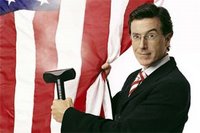 Stephen Colbert and his "Colbert Report" show/persona are a perfect blend of old and new media content, making it a major media trend to watch unfold in the near future, even if much of mainstream media missed the point of his skit.
Stephen Colbert and his "Colbert Report" show/persona are a perfect blend of old and new media content, making it a major media trend to watch unfold in the near future, even if much of mainstream media missed the point of his skit.
It really was a bravura performance of truthiness.
The term "Stephen Colbert" and his brand of truthiness continues to tear up the search engines, earning among the top 3 search terms on both Technorati and Yahoo Buzz Index for the past 10 days since the White House Correspondent's Dinner comedy spoof on George W. Bush and his administration.
On the Technorati blog, they report:"Stephen Colbert" and "Colbert" have been the top Technorati searches all week, which is a nice real-life example of how mainstream media and the blogosphere are so different...While the mainstream media properties were pointedly silent about the speech, bloggers were busy commenting about the speech, uploading video clips of the speech, and transcribing it word for word.
As of this posting, there are more than 55,000 thank yous since his April 29th performance at thankyoustephencolbert.org.
If you looked at the New York Times or the Washington Post Monday morning, you would have no idea that anything out of the ordinary had happened at that dinner. But if you went to Technorati on Monday morning, you'd see Stephen Colbert everywhere--top searches, top tags, and in Explore: politics. Finally, on Tuesday or Wednesday, the rest of the media started covering the buzz around the speech, after those in the know--the Technorati--had been talking about it for days.
Salon.com says The Truthiness Hurts:Stephen Colbert's brilliant performance unplugged the Bush myth machine -- and left the clueless D.C. press corps gaping...It's a wonder the secret service let him so close to the President of the United States.
The Yahoo Buzz Index asks: Was Colbert Mocking the Man?
CrooksandLiars.com asks Was Colbert snubbed? The Washington Post' Richard Cohen commented on the digital lynch mob that has formed since the speech....which brought on the wrath of the political blog Daily Kos.
If anyone is wondering why President Bush's approval ratings are down to 31% and falling, the blogs explain it all in pure truthiness...you know, good old facty facts. As Joan Walsh of Salon.com says"...the mighty Colbert or the clueless, self-important media elite he was satirizing. For those who think the media shamed itself by rolling over for this administration, especially in the run-up to the Iraq war, Colbert's skit is the gift that keeps on giving. Thank you, Stephen Colbert!"
posted by Unknown @ Wednesday, May 10, 2006,
,
![]()
![]()
Warner Releasing Content To BitTorrent: "It was always inevitable"
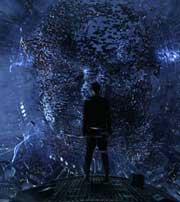 When Neo went to Machine City to partner up with The Source in order to defeat Smith in The Matrix, it formered a powerful alliance that won the day. It makes for a strong metaphor in a decision announced yesterday when Warner Bros (with one of the world's largest content library) said it would be actively start distributing TV and movie files through peer2peer BitTorrent pipelines. Neo (we good content users) partners with The Source (Warner) in order to defeat Smith (bad pirate content users), agreeing to use BitTorrent zen kung fu.
When Neo went to Machine City to partner up with The Source in order to defeat Smith in The Matrix, it formered a powerful alliance that won the day. It makes for a strong metaphor in a decision announced yesterday when Warner Bros (with one of the world's largest content library) said it would be actively start distributing TV and movie files through peer2peer BitTorrent pipelines. Neo (we good content users) partners with The Source (Warner) in order to defeat Smith (bad pirate content users), agreeing to use BitTorrent zen kung fu.
In a major turnaround from the Napster 1.0 days and going against the traditional grain of content owners (as well as their lobbyists), Warner Bros. has made a stunning concession acknowledging its digital reality, announcing yesterday it will stop its resistence to digital file sharing of its content and knowingly distribute movies and TV shows using peer-to-peer technology from BitTorrent. This makes Warner Bros. the first major studio to actively contribute content to such a service, which has been largely used for underground music, video, movie and other audio/video file sharing and for digital pirates. Instead of disavowing peer2peer digital trading and sharing, Warner Bros seems to be giving their thumbs-up and going with the marketplace demand.
This makes Warner Bros. the first major studio to actively contribute content to such a service, which has been largely used for underground music, video, movie and other audio/video file sharing and for digital pirates. Instead of disavowing peer2peer digital trading and sharing, Warner Bros seems to be giving their thumbs-up and going with the marketplace demand.
Apparently, the studio aims to head off pirating by offering what it presumes to be reasonably priced shows and movies. They plan to begin offering TV shows and movies by this summer. Finally, a simplier way to get Smallville when I miss the weekly broadcast! No official pricing has been set, but TV shows could go for around $1 and movies for the price of a DVD, the companies said. Sounds good to me.
Taking notice of the successful test model employed by ABC showing their TV shows online the night after its TV broadcast, expect more TV and movie houses to jump on board. Not only will it make their content more viewable, it will ensure a better quality of downloaded shows instead of the often poor resolution versions. Plus, it will bring revenue back to the broadcaster they haven't gone on after until now.
Warner Bros. estimates its movies could be downloaded in about ten minutes and TV shows in less than that. BitTorrent is the global leader in peer2peer file sharing online, connecting users millions at a time. P2P tracker BigChampagne estimates more than 80 million consumers trade more than a billion files worldwide every year now. The digital genie was let out of the bottle a long time ago. Consumers want they content when they want it -- they don't want to wait. They want it playable on whatever device they choose. They want to get the content quick and easy -- no hurdles, no hassles. And now a major force in Big Media is stepping forward to participate. It's a huge victory for multi-media, multi-taskers.
BitTorrent is the global leader in peer2peer file sharing online, connecting users millions at a time. P2P tracker BigChampagne estimates more than 80 million consumers trade more than a billion files worldwide every year now. The digital genie was let out of the bottle a long time ago. Consumers want they content when they want it -- they don't want to wait. They want it playable on whatever device they choose. They want to get the content quick and easy -- no hurdles, no hassles. And now a major force in Big Media is stepping forward to participate. It's a huge victory for multi-media, multi-taskers. The adage "when you can't beat them, join them" applies here. Also, when Neo says to Smith "You were right...It was always inevitable."
The adage "when you can't beat them, join them" applies here. Also, when Neo says to Smith "You were right...It was always inevitable."
And now we'll be able to download The Matrix from Warner Bros. legally.
reference article here
posted by Unknown @ Wednesday, May 10, 2006,
,
![]()
![]()
Going Private: Emmis Breaks Away From Wall Street
 Emmis Communications just announced this morning it plans to buy back all its publically-traded stock and return being a private broadcast company...becoming the largest private radio broadcasters in the country. Of course, shareholders still need to assess the plan but it looks like a good one. This is good news for radio and hopefully will start an important corrective trend for radio operators breaking the seductive grip from Wall Street.
Emmis Communications just announced this morning it plans to buy back all its publically-traded stock and return being a private broadcast company...becoming the largest private radio broadcasters in the country. Of course, shareholders still need to assess the plan but it looks like a good one. This is good news for radio and hopefully will start an important corrective trend for radio operators breaking the seductive grip from Wall Street.
Last September, Joint Communications CEO John Parikhal got trade headlines participating at the NAB radio conference speaking about the "Future of Radio" when he recommended "radio should go private again" and break away from the demands of Wall Street in order to focus on its most important need: to innovate and reinvent.
Looks like Emmis listened carefully and agreed with that view of the future.
Throughout the 1990s, "bigger is better" was the constant mantra concerning radio owners. They wanted more. More! In 1990, radio attracted about 7% of all advertising dollars spent in the U.S...a much smaller amount -- by far - than spent for ads on TV or newspapers. The false logic/augument at the time was radio needed a more consolidated voice in order to compete better with other media operations in order to command stronger shares of total advertising dollars.
As regulations eased allowing radio groups to own more and more radio stations in local markets and across the country, massive new radio broadcast companies were created, such as Clear Channel (which went from owning less than 20 stations in 1990 to 173 in 1997 to its current amount of more than 1200 radio stations. That's 9% of all commercial radio stations broadcasting in the U.S. owned by one company. While it does create a more powerful, consolidated corporate voice...and other companies also grew much larger...it didn't achieve the desired sales pitch which helped relax the ownership regulations.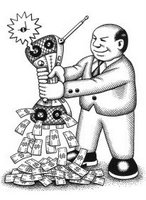 Some, in fact, see the radio "reforms" of the past decade a complete "folly".
Some, in fact, see the radio "reforms" of the past decade a complete "folly".
For all the effort creating these megaradio companies, total radio advertising dollars remain approximately 7-8% of all ad dollars spent on the media. In exchange, radio has focused its heavy cash-flow profits under fewer owners, become less flexible, more bureaucratic, more commercials, less independence, and somewhat more detached from local communities as radio now operates smaller workforces, utilitizes more syndication and offers less local customization.
Returning private is one way radio can become more distinctive again. What used to be the "spirit of radio" a generation ago is now found on the Internet because of its consumer-driven, grassroots appeal. Getting consumer-driven and grassroots as private radio broadcasters is a positive step in the right direction.
18 months ago, in order to combat a perception of playing too many commercials, Clear Channel implemented a "Less is More" campaign of fewer adtime every hour. Will "Less is More" also apply to radio ownership? Will we see radio more companies going private? Selloffs? Splits? Will other public radio groups follow suit? Seems likely. It would be a good thing for radio and radio listeners...and make radio more competitive against all new digital radio threats.
posted by Unknown @ Monday, May 08, 2006,
,
![]()
![]()
Big Brassy Balls: The Colbert Blog Victory Mainstream Media Missed
Labels: Big brassy balls, blog, Colbert, Colbert Report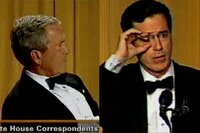 The media trend of truthiness continues to dig in deeper.
The media trend of truthiness continues to dig in deeper.
It's been quite a week for the father of truthiness Stephen Colbert. First, he was the final speaker at the annual White House Correspondent's Dinner, where he skewered George Bush and his Cabinet with verbal smart bombs using his "Colbert Report" persona and even enlisted pressroom Grand Madame Helen Thomas in his spoof "audition tape" for the White House Press Secretary job he was never offered.
In case you missed it, here's the transcript of his performance.
And here is the actual video -- part 1 and part 2.
Then he was named as one of Time magazine's 100 Most Influential. This week's blog explosition mostly in favor of Colbert shows exactly how influential he's become.
The blogs all got the story: Boing Boing, Instapundit, Drudge, DailyKos, Huffington Report, and thousand more (including the Jointblog). Even the official press release version from the White House Correspondent's Office applauded it.
However, the most important part of the story is that mainstream media seemed to overlook the fact that someone - FINALLY - had the courage to directly deliver to President Bush the frustration felt by the 68% of the population disapproving Bush. The "underground" blogs clearly got it. And mainstream News missed once again.
Most core conservatives didn't get the style of humor (what? they don't watch the show?) and the White House itself said Colbert's joking was misplaced or simply said it wasn't funny. It was reported Bush even frowned during the performance. The mainstream media mainly printed pictures of Bush's stunt double pretending to be Bush, hardly mentioning a thing about Colbert's bravura performance.
Some -- like Time -- did ask if Colbert was funny or not. But most seemed to think mainstream media missed the story, including venerable news institutions like the Washington Post. Sure, the office of the President deserves respect and a degree of demurement. Last I checked, though, this was a Republic for the People. There is a reason the media is called the Fourth Estate. Truth needs exposure, it needs the light. And News organizations are charged with that responsibility. But why is it they so often hestitate to confront?
Online, the Colbert story was one of the hottest search items of the week. According to the Yahoo Buzz Index, searches on Colbert were up 5,625% this week and picking up speed. Trajectories for "Colbert speech" and "colbert video" are racing off the chart. And "The Colbert Report," its fan site Colbert Nation, and the newly created ThankYouStephenColbert.org also launched upward in Buzz. Same thing over on both Google Video and YouTube, which both carry the C-Span video. Colbert accomplished something millions of Americans have wanted to do -- give President Bush a piece of their mind. That he did in spades, in true truthiness style, using his infamous "big brassy balls". Even if it was done in double-speak. Perhaps that's the only language this White House understands.
Colbert accomplished something millions of Americans have wanted to do -- give President Bush a piece of their mind. That he did in spades, in true truthiness style, using his infamous "big brassy balls". Even if it was done in double-speak. Perhaps that's the only language this White House understands.
posted by Unknown @ Sunday, May 07, 2006,
,
![]()
![]()
40% of American adults now play computer games
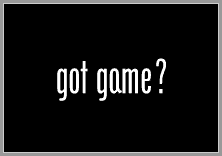 Got game?
Got game?
According to a new AP-AOL Games poll, 40% of American adults do, playing games on a computer or a console. Men, younger adults and minorities were most likely to play those games. They are everywhere -- online, on cellphones, on PCs and hooked up to the home theatre system. What used to be mainly a video arcade domain for high school boys a generation ago now seems to be just a quaint American memory. Now gaming is for everyone. From computer solitaire on the office PC to the online emersion world of Everquest, computer gaming is hot business and a defining media trend, attracting even greater interest in Madison Avenue advertising.
Among those who describe themselves as gamers, 45% play over the Internet. And more than a third of online gamers spent more than $200 last year on gaming, compared with nearly a quarter of those who don't play games online.
Online gamers also spent more time playing those games.
Forty-two percent of online gamers said they spent at least four hours playing games during an average week, compared with 26% of those who don't play online. About one in six online gamers play more than 10 hours a week.
The survey results come as Sony, Nintendo and Microsoft prepare to push their new consoles this week at the Electronic Entertainment Expo in Los Angeles. All three are hoping to make broad online features such as multiplayer games, video conferencing and downloadable content a core element of the video game experience.
For more, click here
posted by Unknown @ Sunday, May 07, 2006,
,
![]()
![]()
ABC test website crashes as fans view free streams of hit TV shows
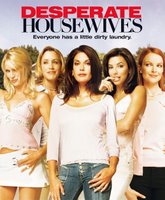 Earlier this week, I decided to take advantage of ABC's online experiment showing free streams of their hit TV shows. Part test model to measure potential online usage, part additional stream to promote shows like Alias, Desperate Housewives and Lost during these crucial May ratings sweeps, ABC is offering the option until the end of June to view select shows with limited commercial inserts for free. For those preferring to simply pay for the download through iTunes, that $1.99 option also remains.
Earlier this week, I decided to take advantage of ABC's online experiment showing free streams of their hit TV shows. Part test model to measure potential online usage, part additional stream to promote shows like Alias, Desperate Housewives and Lost during these crucial May ratings sweeps, ABC is offering the option until the end of June to view select shows with limited commercial inserts for free. For those preferring to simply pay for the download through iTunes, that $1.99 option also remains.
So what was the experience like?
Not bad. There were only 3 one minute commercials (promoting new movies). And you don't even have to watch the entire ad; ABC kindly gives the click option to skip the rest of the ad to return to the show after approximately 20 seconds. I'm not sure why they give the option since it seems to defeat the purpose of this temporary experiment; however, I appreciated it and took full advantage of it to get back to the show.
The viewer offers a small or expanded screen option. Unfortunately, the screen is still small on my 17" Powerbook. There is no full screen option. The stream got glitchy a few times and even stalled to the point where I had to quit the browser and restart the viewing. But, overall, it was an okay experience...especially since it allowed me to watch Housewives for the first time since The Sopranos new season began in early March. Apparently, many people are testing out the free streams. Either that or ABC didn't allocate enough bandwidth to handle traffic since some heavy system crashes have been reported.
Apparently, many people are testing out the free streams. Either that or ABC didn't allocate enough bandwidth to handle traffic since some heavy system crashes have been reported.
Click Z News reports":ABC's web site crashed twice yesterday as Internet users flocked to watch streaming versions of its most popular shows, including "Lost" and "Desperate Housewives."
Regardless of these brief outages, it appears (no surprise) that this experiment is a success and a good backup for the VCR/TiVo/download-adverse crowd to make sure they don't miss their favorite shows. It's a sneak peek at how the Internet will deliver "mainstream" content by all the major networks in the not-too-distant future.
It was the first time the shows were available online directly from the network, and the first time the advertising community had gotten a look at what ad products would be offered. It was also the first opportunity for the industry to gauge how popular such an ad-supported offering might be with consumers.
The site crashed for two periods beginning at 6:30 a.m. EST and 2:00 p.m. EST, according to data from Keynote Systems, which offers traffic and site performance analysis services. The outages lasted a half-hour and an hour-and-a-half each, respectively. The data was based on attempts to access the ABC site from 31 cities worldwide.
posted by Unknown @ Thursday, May 04, 2006,
,
![]()
![]()















